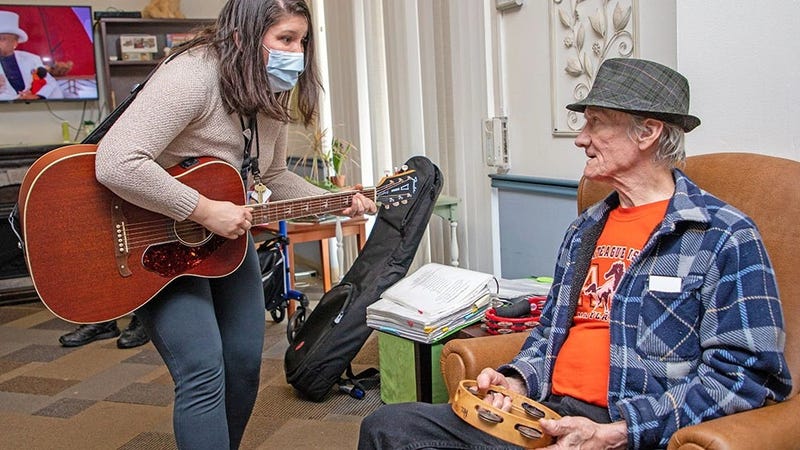
Alicia Chopyk, music and neurologic music therapist with the Department of Veterans Affairs in Wilmington, Delaware uses song and instruments to help veterans in the Community Living Center there.
“Music therapy is kind of like we’re all on a journey. What we look for in music therapy is how do we use music or experience it? Whether it be creating, listening or engaging in music, we recreate that to help our health and mental health in the process,” she said in a VA release.
Music therapy can help veterans suffering from memory impairments, speech disorders, head traumas and other challenges. Getting veterans to buy into alternative techniques and letting them know it is a collaboration is only the beginning, Chopyk said.
“I think of music as a collaboration, meaning we are in this together,” she said. “We are equals because I’m not going to force you to do something. You don’t want to do this? We can do something else. That’s the beauty of music therapy. You must want to do it.
“I never want to disappoint. I always want to be realistic, but I also want to help them redefine what it is to create music. Just because you can’t play the guitar the way you want to doesn’t mean you don’t have a fire to play or you don’t need that kind of musical release.”
Chopyk is well versed in guitar, piano, singing, classical flute and piccolo, but she uses her experiences with veterans to learn other instruments they are interested in as well.
“I had a patient who loved the violin and that’s a hard instrument. I had to teach myself how to do it. But I took the approach of being honest, being upfront, saying look, you want to play violin, I’m game. However, I want you to know this is not my strong suit,” she said.
Chopyk said music therapy is sometimes just about being comfortable talking about music with someone else. She says often veterans will engage more once they find something in common with someone through music.
“Sometimes veterans just want to talk. One veteran and I were talking about Johnny Cash’s life, his music and prison,” she recalled “What a redemption story, to be able to look back at your own sobriety, and ask yourself, can I create a redemption story through all my struggles that I’ve been through?”
Music not only opens minds. It can help veterans talk about experiences that are difficult.
“I think of music therapy as improv. You never know what’s going to happen. I come in with a plan knowing the plan could be thrown out the window, and that’s fine,” Chopyk said. “We can adjust everything based on what’s happening in the moment. That’s one of the coolest things to teach people, just be flexible in the moment.
“The learning is a really cool process, but it’s still about therapy.”
Reach Julia LeDoux at Julia@connectingvets.com.


